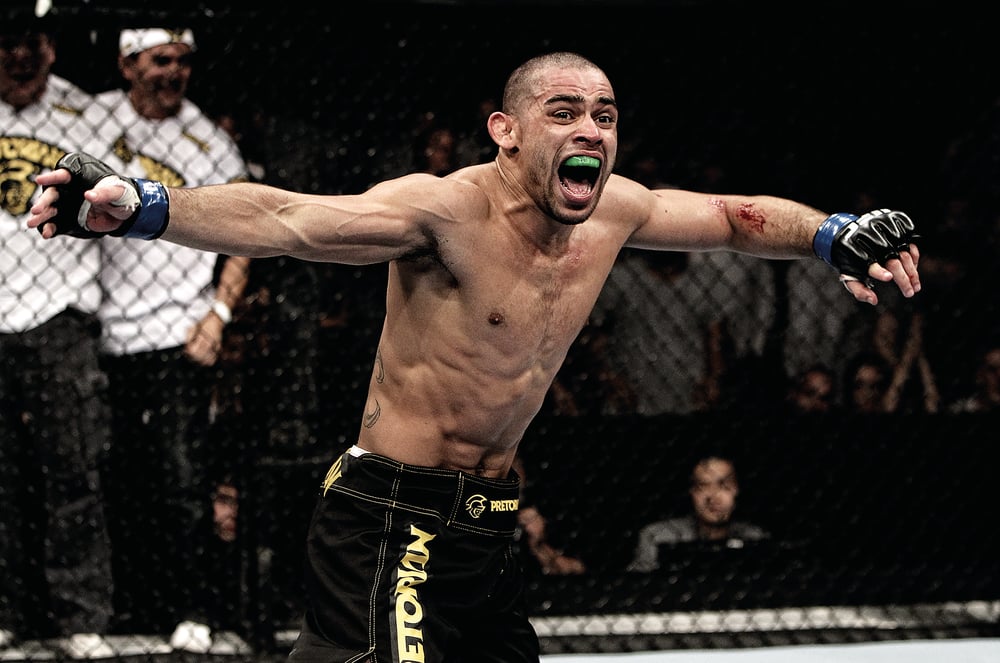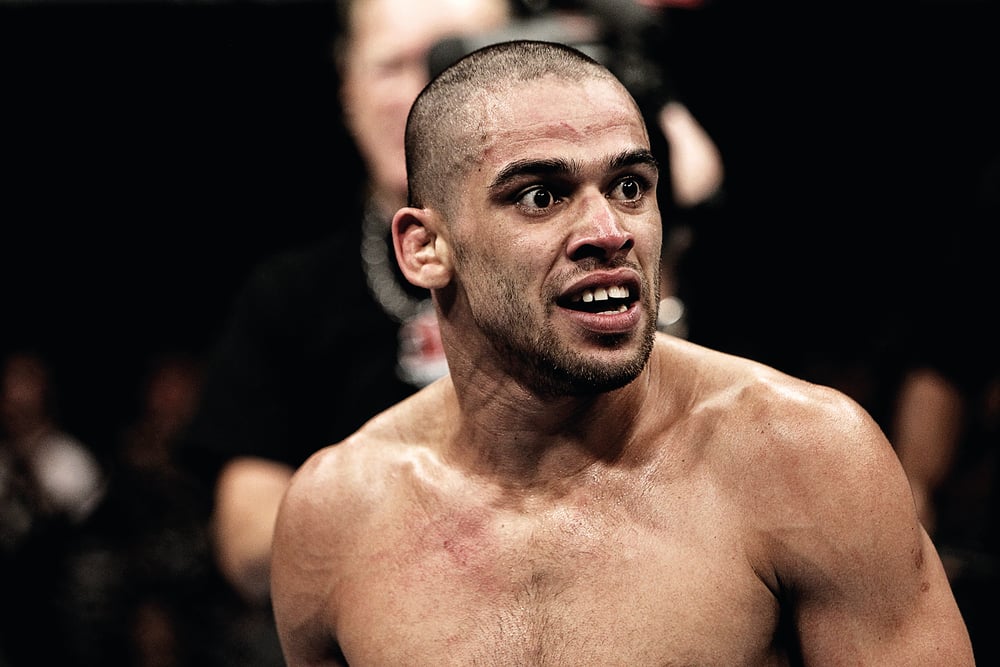
Issue 105
September 2013
How an impromptu meeting 15 years ago led to Renan Barao becoming a UFC world champion
Renan Barao took it upon himself to meet his father. He wasn’t certain what the man looked like, but Renan knew where he worked. That was enough. An absentee father who missed the first 11 years of Renan’s life, Jose Pegado hadn’t married Renan’s mother – she’d given birth when they were both teenagers.
His future UFC world champion son, who 26 years later would be one of Brazil’s best fighters and the owner of one of the longest winning streaks in MMA history, was instead raised by Renan’s mother, aunt and grandparents. It should be no way for a boy to meet his father, shyly announcing his blood bond to a stranger. But every cloud has a sliver lining. And this silver lining just happened to transform Renan’s entire life.
“I had a very poor childhood, so humble in terms of the material aspect of life,” Renan, one of nine brothers, reveals to Fighters Only. “I grew up in Quintas, one of the meanest neighborhoods in Natal, Northeastern Brazil. I was always a child who created a lot of trouble in school, and I even began to get involved with the wrong crowd.”
Which was partly why Renan’s family encouraged him to introduce himself to his father, seeking to put an end to Renan’s adolescent revolt. However, they couldn’t have predicted how significant that would be. Despite Jose not being a dad to young Renan for over a decade, the two immediately found a bond: boxing.
Renan never did well in any sport, but boxing? That was different. He was good at it, it felt right and it fostered something he’d never had before. “I got closer to my father because of boxing,” Barao offers. Perhaps just as important as this new father-son relationship, boxing started to give Barao the discipline his family sought.
The new focus 11-year-old Barao gained continued to shape his life when he immediately expanded his training, picking up jiu-jitsu and Muay Thai with just as much vigor and passion, with the guiding hand of Jair Lourenço, head coach at Nova Uniao affiliate, Kimura, in Barao’s hometown.
At 14 he started kickboxing competitively, and two months after his 18th birthday he made his mixed martial arts debut. Things didn’t start well; although a defeat would be followed by a stellar 31-fight undefeated run. Fleeting thoughts of retirement quickly turned to determination, turned to wins, turned to a dream, turned to a one-way ticket to Rio de Janeiro to train with Andre Pederneiras and his team of future champions at Nova Uniao HQ. By now Barao knew he wanted to become a UFC champion.
He and friends Ronny Markes and Ronys Torres, both future UFC fighters, shared the trip from Natal to Rio. They also enjoyed each other’s company in their windowless, doorless living quarters above the Nova Uniao gym. Money to live on was sparse, and Barao has stated he attended morning training on an empty stomach more than once.
Ultimately, though, all the sacrifice would be worth it. He developed into a five-foot-seven wrecking machine, as devastating on the ground as on the feet. His initial string of 24 bouts without a loss caught the attention of WEC matchmakers. He made a victorious debut at WEC 49 in 2010, and has continued the tradition ever since, right into his current reign as bantamweight leader.

His ascent has been remarkable. And there are a clutch of simple reasons for it: a persistent desire to learn new things, a respect for the necessity of stamina and something much more intriguing. “I think the psychological side of the sport is very important too,” explains Barao. “Because of that I always train looking toward the win. I don’t think about fighting, I think about winning. I will always look for the win for me, for my team and for my fans.”
In reflection, it’s clear to Barao, who now has children of his own, where his life could have gone so wrong. “What saved my life was MMA,” he says. “Mixed martial arts taught me to be a better person and to have more discipline and to respect people.
“I always remember, looking back, the effort my grandparents made to give me a better upbringing, or at least to give me food. My grandfather worked in a fair and he was pretty much the one who provided support for my family for a long time. Today I look to give him a better life.”
He might not be getting ‘Anderson Silva money’ wired to him for each Octagon victory, but at least the struggles to merely find food on a daily basis are long behind him, and he can help provide for those who did the same for him. The UFC’s reigning interim bantamweight kingpin, Barao (actually a nickname given to him by his grandmother, Pegado being his real surname) is second in the world at 135lb to Dominick Cruz, the fully credentialed yet injured division title owner.
Now 26, Barao hasn’t lost a bout since that 2005 debut – the majority of which he fought 10lb heavier than his current weight class, and two thirds he has finished early.
He’s now reaping the benefits of eight years of professional toil, the result of which was winning the interim belt in a decisive five-round judges’ nod over beloved MMA veteran Urijah Faber in July 2012. Just 14 years after his ex-Brazilian boxing champion father first helped him slip on a pair of gloves. Even though he still can’t legitimately call himself the ‘undisputed’ title-holder, for Barao, the time for toeing the line of humility line has ended.
“I definitely feel I’m the champion of the weight class,” he asserts. And he has an argument. “I am the one who stands for the bantamweight division and I consider myself the champion. It’s me who is training, fighting, defending the belt, not him.”
Two successive knee injuries have prevented Cruz from contesting his belt with a queue of bantamweight contenders since an October 2011 defense against Demetrious Johnson. In those 21-plus months, Barao has fought four times. In the third he won the title, in the fourth he defended it. And if Renan does get to fight Cruz, he fancies his chances.
“The biggest challenge is to make it happen,” he sighs. “This is the biggest challenge: to make the fight happen. I am waiting for him and I think I can beat him up – with all the due respect I have for the good fighter Cruz is.” The confidence is practically palpable.
Of course, training with some of the best lighter weight fighters in the world helps with that. Nova Uniao is, after all, the base of operations for UFC featherweight king José Aldo, reigning Bellator 135lb champ Eduardo Dantas, ex Sengoku featherweight crown-wearer Marlon Sandro and TUF Brazil 2 winner Leonardo Santos. In fact, it’s no stretch to think of Nova Uniao as a modern version of former Brazilian powerhouse gyms Chute Boxe and Brazilian Top Team.
“I think it is because of the professionalism with which we treat the sport, always looking for the best technical and conditioning preparations,” Barao hypothesizes when asked why Nova Uniao is so successful. “We have coaches from all over the world who come in for our training camps to help us improve and become better fighters. Besides that, I would say the environment of Nova Uniao is fundamental to the good performances. There is a real family feel, everybody respects everybody and helps each other.
“I chose to train at Nova Uniao exactly because of that, for the family we are.” The simple pursuit of combat excellence has given Barao a platform for personal betterment, an income to pay back those who raised him, and an entire brotherhood on which to build a legacy worthy of a lifetime. It’s amazing, what a father can do for his son.

BARAO ON FEAR
Your entire career has been one of dominance. Many people believe Georges St Pierre is such a dominant champion because he is scared. Are you?
“Scared, me? Of course not. You only have to see my fights to know that. I am the style of fighter who walks ahead, I attack and counter-attack every strike. My style is always this: attack and walk forward. But each fighter has his own style.”
BARAO ON PRESSURE
Do you feel greater pressure when you fight today as mixed martial arts continues to become more and more popular in Brazil?
“No, I feel relaxed. This popularity is only the recognition of the work of mine and other fighters from Brazil. When we come into the Octagon, we don’t think about who is there watching, we think about winning and showing our work. Of course, the crowd outside the cage gives us more strength, but it is not pressure whatsoever, it’s motivating.”
RENAN BARAO TIMELINE
1987
Born Renan Do Nascimento Mota Pegado in Natal, Brazil. Nicknamed ‘Barao’ by his grandmother after a Brazilian soap star.
1998
Already training in boxing, at 11 begins training at Kimura Nova Uniao where he adds Muay Thai and jiu-jitsu to his combat knowledge.
2001
Begins his fighting career at an early age, beginning kickboxing competitively at the
age of 14.
2005
Turns professional in MMA at 18 and loses his first fight via decision against Joao Souza at Heat FC 3 in his hometown.
2006
Endures his first real test since his debut against highly touted featherweight Rony Jason at Cage Fight Nordeste, winning a close split-decision victory.
2007
Makes his Shooto debut, where he finishes Erinaldo Rodriguez in the first round with a toe hold submission
2008
The most active time in his career, Barao has seven fights during the calender year, finishing four of them via submission or knockout.
2009
The streak continues with another five victories, ending the year with an impressive 22-1-(1) record.
June 2010
Earns a call-up to US-based promotion WEC to face Anthony Leone in a 142lb catchweight bout. Dominates Leone for three rounds before finishing him via armbar.
December 2010
Makes his 145lb debut against Chris Cariaso, who is on a 4-0 win streak. Wins via rear naked choke just 3:47 into the opening round.
2011
Makes his UFC debut and dominates Cole Escovedo to a decision at UFC 130 before submitting Brit Brad Pickett with a rear naked choke at UFC 138.
July 2012
After defeating Scott Jorgensen at UFC 143, Barao replaces an injured Dominick Cruz to take on Urijah Faber for the UFC interim bantamweight title at UFC 149. He controls Faber for five rounds, defeating the former WEC champ by decision.
February 2013
Defends his interim belt for the first time against Michael McDonald in London. After four rounds of back-and-forth action, he locks in a tight arm triangle choke in the fourth round.
June 2013
Originally scheduled to defend his interim title, this time against Eddie Wineland, he suffers an injury, knocking him out of the UFC 161 headliner.










